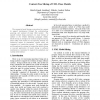313 search results - page 37 / 63 » Building Models through Formal Specification |
104
Voted
SIGSOFT
2005
ACM
16 years 3 months ago
2005
ACM
Fluent model checking is an automated technique for verifying that an event-based operational model satisfies some state-based declarative properties. The link between the event-b...
110
click to vote
ICSM
2005
IEEE
15 years 8 months ago
2005
IEEE
In the work presented here, we introduce a method to automatically generate a subset of a UML class model based on a user-defined criterion. The goal of this work is to allow us to...
140
click to vote
NGITS
1999
Springer
15 years 6 months ago
1999
Springer
As the requirements for system analysis and design become more complex, the need for a natural, yet formal way of specifying system analysis findings and design decisions are becom...
120
Voted
MIDDLEWARE
2001
Springer
15 years 7 months ago
2001
Springer
Although it has long been realised that ACID transactions by themselves are not adequate for structuring long-lived applications and much research work has been done on developing...
190
click to vote
ESEC
1999
Springer
15 years 6 months ago
1999
Springer
CIP is a model-based software development method for embedded systems. The problem of constructing an embedded system is decomposed into a functional and a connection problem. The ...



